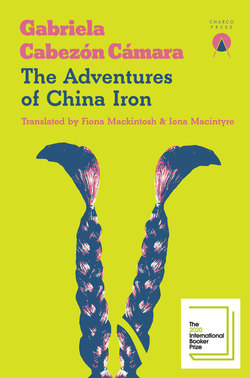Читать книгу The Adventures of China Iron - Gabriela Cabezón Cámara - Страница 13
На сайте Литреса книга снята с продажи.
ОглавлениеAt the Mercy of the Caranchos
It only took a few days of wagon, dust and stories for us to become a family. Entwined in our burgeoning love we laughed at old fears of being abandoned, of being defeated, of falling to the ground without the strength to get up, stuck to the ground and left at the mercy of the caranchos, of being reduced to what we are: a structure of bones and minerals, like stones. Weaving ourselves as one, we were slow to notice that the near nothingness we were crossing was starting to look like an abandoned burial ground; we ploughed on blithely, as if we were travelling through paradise, though maybe I’m wrong, maybe paradise isn’t a place to travel through, it’s simply a place to be. Where would one want to go from here?
Days of going more or less in a straight line had passed without us seeing a single cow, Indian, white man, or horse. Weeks of flat days as if there was nothing in the world but weeds, one or two little mules, and the caranchos. Occasionally at night a hare would be dazzled by the light from our campfire and Estreya would give chase and sometimes catch it. That and the earth pearled with bones when the wind or rain came. The dust was merciful, covering everything including the skeletons lying by the wayside; little by little it covered them leaving faint relief carvings, imperceptible burial mounds, little more than oversized ant hills, but also teeming with life, the life of worms born in dead flesh.
Until the rain came again and once more we’d see a cemetery of Indian braves at our feet: we could make them out because they were one with their weapons and animals, as if the heroic skeletons of the pampas were centaur fossils, said Liz. I didn’t know what a centaur was and I definitely didn’t know that Indians could be brave. I think it was with that story and that discussion that we reached the third week of our journey. We rested, we washed again, this time in an almost crystalline river with just a pair of herons for company. Nor did I know what a desert was, even though I realised that so much emptiness couldn’t have been the natural state of this pampa. I didn’t know that a desert was exactly that, a territory with no population, no trees, no birds, without almost any sign of life in the day except for us. I thought desert was the name of the place where nobody lived but Indians. Either way, the desert was getting more and more frightening; we started having nightmares, sometimes even in the daytime. I began writing in order to fend off these nightmares. Liz would teach me my letters and tell me what prayer to say at bedtime. I still know some. ‘Dear Lord, please send us un amigo. And save us from the quagholes’.
And if trust in our prayers wasn’t enough to send us off to sleep, Liz and I would drink a whisky, that elixir of life in Britain, water from Scotland’s water and above all, she explained to me, earth from Scotland’s earth, which turned barley into this nectar. They soaked the grain in hot water and left it till it sprouted. Then they dried it using a smoke made with tree branches, with sticks and sometimes with peat, a kind of earth made of plants that haven’t become earth yet. We could make whisky. We really could: we just had to get some grain, some oak barrels and funnels, some stills with long iron tubes. The snag is how long you have to wait: it takes whisky twelve years in the barrels before it’s ready. I liked whisky and I also liked the fact that I liked it: I wanted to be British too.
